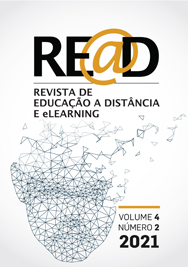Avaliação digital autêntica: questões e desafios
DOI:
https://doi.org/10.34627/vol4iss2pp22-40Palavras-chave:
atividades autênticas; autenticidade; avaliação digital; competências digitaisResumo
A expressão avaliação autêntica em educação tem vindo a ganhar cada vez mais visibilidade ainda que sujeita a diversas interpretações como se constata na literatura. Assinala-se, contudo, que o ponto de partida é a valorização da autenticidade na aprendizagem e a conexão à vida real/profissional. Este artigo explora essas diferentes interpretações evidenciando elementos que as distinguem e exemplificando o uso da avaliação autêntica em cenários digitais de aprendizagem. A implementação da avaliação autêntica implica definir e desenhar atividades autênticas, o que suscita desafios, em particular, em níveis de educação elementar ou secundário. Neste propósito, apresentamos uma proposta de 5 critérios para avaliar a autenticidade de uma dada atividade: relação com o mundo real, natureza da atividade, complexidade, adequação das condições de realização e adequação da avaliação. Sendo a relação com o mundo real o critério determinante, definimos três graus de autenticidade para aplicação nos diferentes graus de ensino, acompanhado com exemplos ilustrativos. Por fim, procuramos elucidar de que modo a avaliação digital autêntica configura os contextos para o desenvolvimento das competências desejáveis na sociedade atual, incluindo as competências digitais.
Downloads
Publicado
Versões
- 2021-12-15 (3)
- 2021-12-15 (1)
Edição
Secção
Licença
Direitos de Autor (c) 2021 Isolina Oliveira, Alda Pereira

Este trabalho encontra-se publicado com a Creative Commons Atribuição-NãoComercial 4.0.
Os autores conservam os direitos de autor pelo seu trabalho e concedem à revista o direito de primeira publicação, com o trabalho simultaneamente licenciado sob uma Licença Creative Commons - Atribuição-NãoComercial 4.0 Internacional.


